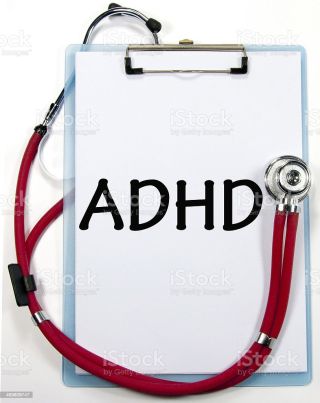ADHD
When Adult ADD/ADHD Goes Untreated
Do you struggle with focus, attention, procrastination and time management?
Posted March 31, 2013 Reviewed by Kaja Perina

Case:
“Doctor, I have been to four psychiatrists during the past 10 years and have tried everything. They tell me I’m depressed or bipolar. The meds always just make me feel worse. I was in therapy for six years and figured it was that I had a bad childhood, but I still feel lousy. Can you help me?”
John contacted me because I specialize in the diagnosis of ADHD and treatment of ADHD in New York City. John met with me for the first time at The Hallowell Center in New York City. His financial firm had sent me similar people in the past—you know, those bright and brilliant people who seem like they should be excelling, but never seem to get their act together. A third of the patients they referred ended up having Adult ADHD and had never been diagnosed. Two of them got better on medications. Another couldn’t tolerate medications but found some relief from specialized goal-focused cognitive behavioral therapy (CBT) for ADHD, as well as executive coaching.
In the opinion of Dr. Hallowell, ADHD is a misnomer – a bad term. He sees ADHD as neither a disorder nor a deficit of attention. In his personal and professional experience, he has come to define ADHD as a trait, not a disability.
John is a 46-year-old single man in a relationship with a woman and has been previously married twice. He has three children. He says he doesn’t know what to do and his girlfriend of 7 months is going to leave him if he doesn’t get some help.
ADHD is over-diagnosed, right?
Well, yes, in some places almost everyone is diagnosed with ADHD. However, more often than not, ADHD is missed and the person is labeled with depression or bipolar disorder.
When someone tells me they are depressed but every type of treatment in the book, including medications and several trials of different therapies haven’t worked, I start wondering if something else is going on. Many times, symptoms of ADHD can masquerade as other diagnoses. People with ADHD often have “mood swings” and difficulty with mood regulation. This isn’t in the DSM IV criteria, but if you have worked with hundreds of patients with ADHD, you know that ADHD causes mood swings. When someone with ADHD is sad or in a funk, they have a hard time shaking it. And when they are excited, they are really excited. This is one of the gifts and wonderful traits of people with ADHD. They are passionate people, passionate about life and passionate about letting other people know about it. If one doesn't spend the time getting to know the person, might think the person has bipolar disorder. Yes, bipolar disorder and ADHD do have a higher rate of occurring together; however, more often than not, people with ADHD who say they have mood swings mean “ADHD swings” not manic swings.
Many clinicians were taught that if someone presents with depression and ADHD, first treat the depression and THEN treat the ADHD. In my opinion, this is just backward thinking. Very often, the patient feels depressed, frustrated, and has lost interest in work and other activities, but this can be because he has experienced one failure after another or has gone from one job to the next. In our experience at the Hallowell Center, when you treat the ADHD, the person begins to acquire the ability to achieve their goals, improve relationships, meet deadlines, remember to pick up the children, avoid accidents on the road, remember their tickets before driving to the airport and feel a lot more competent, confident and happy.
Unfortunately, when patients are treated for depression with antidepressants, or worse, treated with atypical antipsychotics for bipolar disorder and kept on these medications for months or years, their symptoms often do not improve and might worsen. I have never seen this data in the literature, but during my training at Massachusetts General Hospital, I was taught a VERY IMPORTANT PEARL. Never, never, never take away someone’s dopamine. Dopamine gives us a zest for life, motivation, and enables us to pay attention. It is the piece of the puzzle people with ADHD may be missing that inhibits and blocks them from reaching their potential. Guess what antidepressants and antipsychotics do? Through a feedback loop, these medications can decrease the function of dopamine in the frontal lobes and limbic system.
Case:
John says he has never before felt depressed. He has lots of friends and was very popular in high school, college, and at his previous four jobs. He is extremely affable, generous and creative, which is the rule, not the exception with ADHD people. Of course, he was popular. He says he was always the “life of the party” and his teachers and coaches said he was an exuberant and joyful man, yet they were always puzzled that he never quite lived up to his capacity in the classroom or on the soccer field. He seemed to not see the big picture or to perform consistently.
More often than you might imagine, adults with ADHD find themselves without a job and a plan. Losing a job can have many causes, especially in this touch and go economy. But being without a plan is easily associated with ADHD. People with ADHD are characterized by difficulty in visualizing the future along with the inability to put the pieces together to get there.
According to Dr. Lew Mills, ADHD people come to a "full stop." Aside from having difficulty with deciding what to do next, at a full stop they lose all forward momentum. It seems as if they will never find a job. The “full stop” blocks forward motion.
“Paradoxically, an ADHD person may also feel barraged with a torrent of thoughts about where to turn, but each leads to a few weeks of submitting applications, sending a few resumes and then they conclude that something else is more interesting or promising. After some time at the full stop, it is nearly impossible to move forward again. Paralysis sets in and depression can follow.
“For a non-ADHD person, with a raft of experiences of success in their work life, it might make sense to take this opportunity for some serious re-evaluation of one's life priorities. … However, for an ADHD adult, on the brink of depression and perhaps financial ruin, this broader perspective is difficult to achieve and anxiety will soon swamp any view of the big picture.”[1]
Once you lose your momentum, it becomes very difficult to select a career direction. You can easily be overwhelmed by the possibilities or depressed by the lack of possibilities. People with ADHD may find it difficult to make the first move once they reach the “full stop.”
As for John, he was a great student until the 6th grade, when the school became less structured and therefore more challenging. During his early years, his parents helped him structure and plan his studying and schedule. They even quizzed him at night to help him focus and concentrate. He attended a magnet school where the teachers were highly involved and reviewed his homework and calendar, provided a lot of “extra help” and enjoyed his enthusiasm. His coaches in tennis and soccer also enjoyed helping him and, for a while, didn’t mind encouraging him to “focus. Maintain your attention. Make sure to stay alive.” However, they observed that he often seemed to be out in the left field. He couldn’t stay focused during the practices or games. He also had difficulty remembering the strategies that were discussed before the big game.
When his classes became more difficult and he was expected to be more “adult” and autonomous, keeping up became increasingly difficult. He was no longer able to compensate for his lack of organization, foresight and focus, inattention, or inability to plan. His grades began to suffer; he no longer was an A student and started getting Bs and Cs for the first time in his life. He didn’t understand what was happening, and his teachers and parents were just as confused. He became frustrated and demoralized, but remained persistent and continued to put all of his energy into achieving his goals.
Since his parents were consistently involved, he was tutored three times each week. His grades improved somewhat, but never returned to straight A’s.
The “You just aren’t trying” Syndrome:
Hundreds of people we have seen at The Hallowell Center are super intelligent and bright. They may have done very well at certain periods in their lives and no one would imagine that they have ADHD. Often, very organized and structured parents or schools can serve as the person’s “frontal lobes” or breaks in the early years. People with ADHD are great with structure. However, once the structure is gone, they have difficulty providing it for themselves. Then, when they get to college or graduate school and have achieved academically throughout their youth, psychiatrists and therapists hardly entertain the possibility of ADHD. ADHD doesn’t start in an adult. It starts during childhood. However, people with ADHD are often poor self-reporters and historians and may believe they had no trouble with attention or focus when, in reality, they did but the structure of their environment helped them to compensate.
Case:
John did well in school for a while – in the early grades when there was a lot of structure. His high intelligence helped him to compensate. As structure diminished and the difficulty of his coursework increased, he ran into trouble just keeping up.
As I dug a little deeper into his history, I began to suspect ADHD, specifically the inattentive type. I asked him if he daydreamed a lot, even in the years when he was doing well. He said he did and admitted that he would have been late to school every day had it not been for his super competent and organized mother who ran a very tight ship. He said that he often forgot his homework or lunch but his mother would come to the rescue and deliver it to him.
His mother not only ran a tight ship for John but also her husband. She often complained that her husband didn’t listen to her. On the weekends, he would leave projects incomplete. At one point, there were four half-finished projects in the garage. John’s father sympathized with John because he had behaved similarly all of his life. Luckily, he was in a career that allowed him to jump from task to task and he did not need to focus for extended periods. He was a trader on Wall Street and thrived on the excitement and the ups and downs. He hadn't finished college after 6 years of effort, and took an entry-level position, working his way up to the top of the firm.
Family History:
ADHD runs in families. Fortunately, John’s mother was spared and therefore was able to maintain an organized and structured household. John’s father, on the other hand, had had ADHD symptoms but was never diagnosed. The condition didn’t seem to impair his ability to achieve success in his career. Fortunately, he chose a career that was a good match for someone with ADHD. The heritability rate of ADHD in families is one of the highest of any syndromes seen in psychiatry. Despite this, many people in our culture and the mental health field continue to feel it is not a “real” syndrome and don't take it seriously.
Case:
I told John that I highly suspected a diagnosis of ADHD, which is what had been hampering him for most of his life. It was my professional opinion that he did not have depression, bipolar or borderline personality disorder and that his symptoms could get a lot better. I also reassured him that he didn’t have a learning disability or dementia. People with ADHD can have learning disabilities, but more often than not, they are very talented, gifted, and intelligent. When ADHD is recognized and appropriately treated, people with ADHD can finally be free to express their talents and gifts to the world.
John was very relieved and appeared as though he had been given a new lease on life. We discussed the potential treatments including coaching, cognitive behavioral therapy, and medications.
Dr. Hallowell advocates exercise for all of his patients with ADHD. The research shows that exercise for patients with ADHD can be extremely effective for the underlying symptoms. We also started him on 10 mg of Adderall twice a day.
Treatment:
Treatment for ADHD must be individualized, as each person is unique. But some general guidelines are helpful to remember. People are complex and their lives are complex. Treatment isn’t about writing a prescription and seeing the patient once a year. Treatment is about helping people develop a comprehensive strategy to move on with their lives and achieve full potential.
First, the relationship between you and the patient is paramount, whether you are prescribing medications once every three months or are engaged in therapy or coaching.
Second, people with ADHD often have difficulty maintaining and focusing on relationships. Dr. Hallowell believes that social connection is one of the primary pillars of helping someone improve. This MUST be a part of the treatment.
Third, Dr. Hallowell and I both believe that all too often the treatment focus is on deficits or problems. This is how we are all trained—what is the problem and how are we, the treatment provider, going to fix the person?. People come to us with so many gifts, talents, and strengths. It is essential to help the person realize their strengths and show them what extraordinary challenges they have already overcome. The best gift we can give our patients is showing them their power, potential and the possibilities of what CAN be.
Case:
John returned after two weeks, having started taking Adderall. For the first time in his life, he felt like he was “out of the fog.” He wasn’t giddy or anxious; he finally felt “ok,” at the moment. He was engaged in our session, where we discussed and wrote down goals for each area of his life for the next three months, year, and five years. We addressed areas of work, community, spirituality, relationships and personal growth. I recommended we do weekly cognitive therapy at The Hallowell Center to work on these goals, as well as periodic sessions with a coach specifically trained to work with ADHD people.
Later that year, we met and reviewed his accomplishments. He had left his job for a promotion at a competing company and had become engaged to his girlfriend. His mood was much better and he was exercising regularly. We both smiled while discussing the strides he had made. It was extraordinarily exciting for him, and, for me, the reason that I love my work, my relationships with people, and the help I can give them to achieve their potential and to share it with the world. There is no greater gift.
*Disclaimer: Details of cases have been altered to protect the confidentiality of any and all individuals.
[1]The Full Stop - Unemployment for the Adult with ADHD, by Lew Mills, Ph.D., MFT




